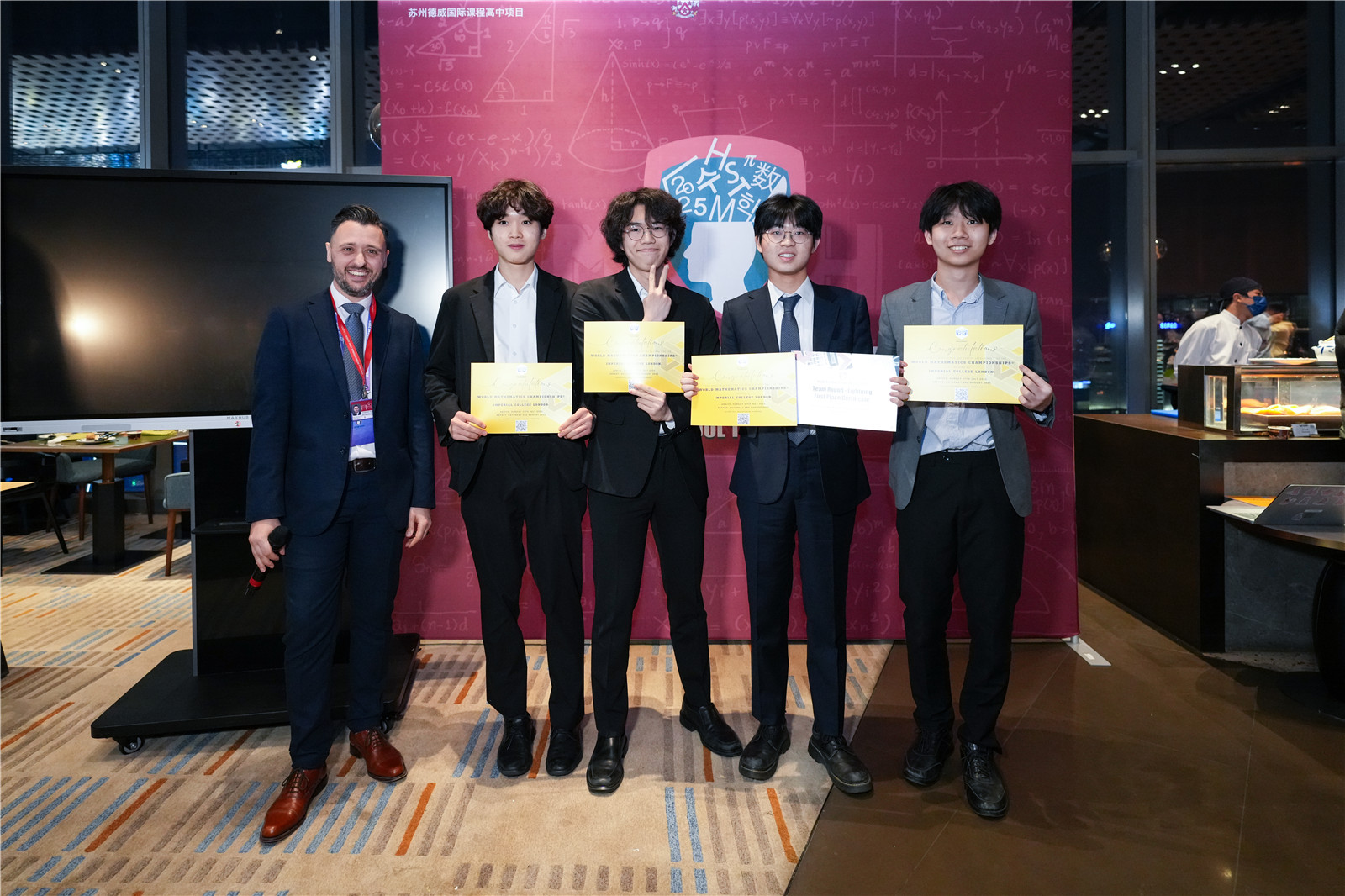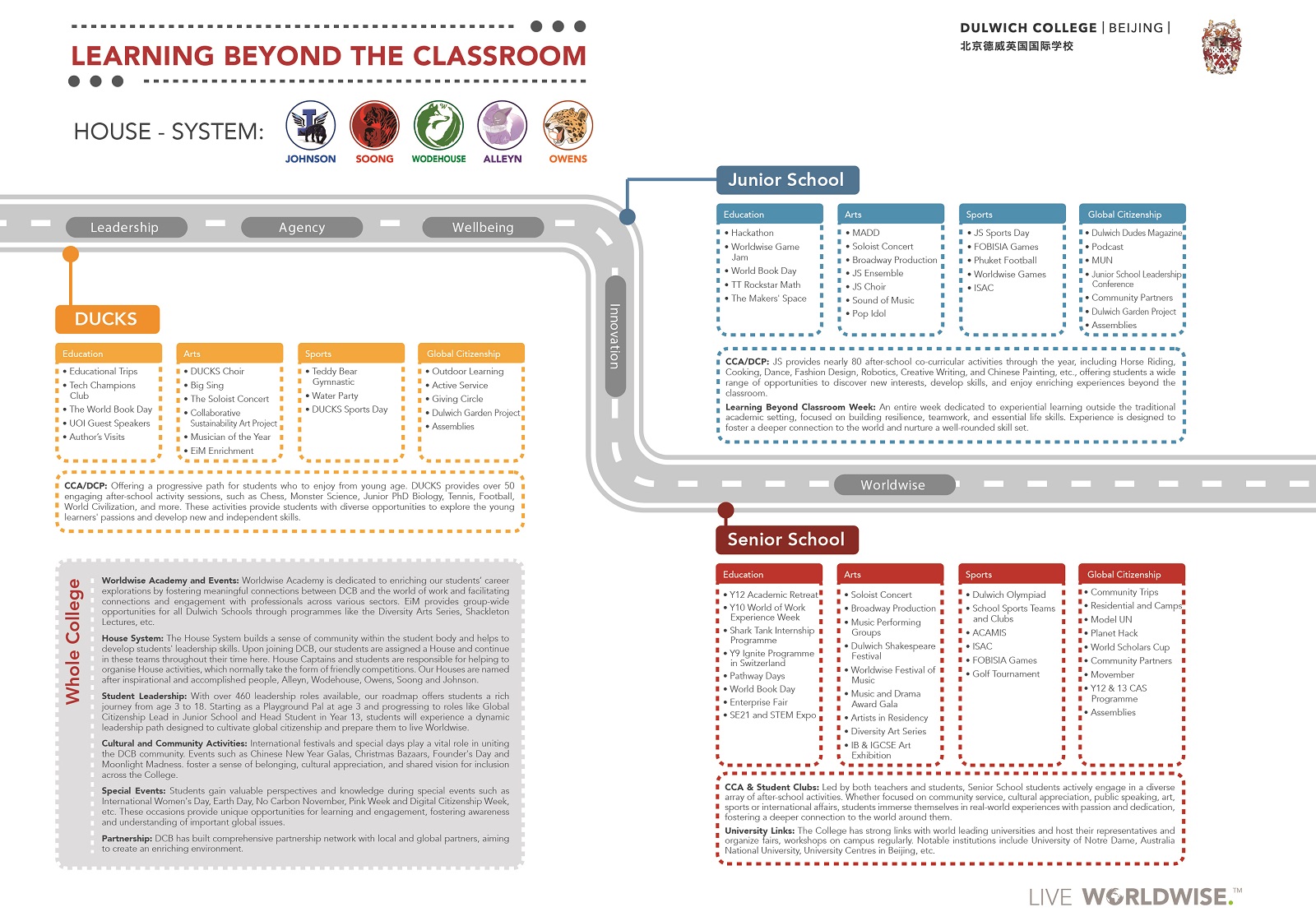DCB Teams' Victory and Growth at Team Maths Competition, Suzhou
In this article, Sean S, one of our Student Support and Communications Prefects, writes about our DCB teams' experience at last month's HSTM (High School Team Maths) competition.
From 7 to 8 March, Dulwich College Beijing sent two teams down south to compete in the annual High School Teams Math Competition, where both teams secured first place in one of the six rounds.
Team Euler grasped victory in the lightning round, granting them a golden ticket to the finals hosted at Imperial College London, thanks to HSTM's partnership with the World Mathematics Championships (WMC). Team Zariski returned victorious in the Crypto round of the competition, finishing first ahead of the competition, but unfortunately, this round did not grant a golden ticket to the finals. Additionally, student John P, won the first in age group award (18 years old). Team Zariski placed second, behind Team Euler, in the Lightning Round, showcasing Dulwich College Beijing’s mathematical strengths.
 Team Euler
Team Euler
 Team Zariski
Team Zariski
What is HSTM?
Now in its 12th year, the HSTM (High School Team Maths) is a two-day international mathematics competition hosted by Dulwich International Suzhou. In this annual competition, Senior School Mathematics enthusiasts compete to solve challenges designed to develop students' teamwork, problem-solving, communication, and mathematical thinking skills. In the process of intense competition, teams not only gain valuable experience but also benefit from cross-cultural exchanges.
This year, 40 teams — 155 mathematicians representing 17 schools across 11 cities — engaged in a clash of wits in six meticulously crafted segments – the Mathematician, Shuttle, Duel, Crypto, Lightning and Codebreaking.
This year's partnership with WMC has added a new international dimension to the event. Winning teams received a 'golden ticket' granting direct entry to the WMC finals to compete with the world's finest mathematics enthusiasts at Imperial College London.
Below, the two team captains share their experiences at this year's HSTM, including the challenges they faced and how they overcame them as a team.
Captain Statements
John P (Captain of Team Leonhard Euler):
Our team's journey at HSTM started with a wave of anxiety. The first round was an 'open book test' where we could use anything from AI to all the resources on the internet. Despite this, the sight of other teams, the pressure of taking the test alone, and the atmosphere that seemed to foreshadow that the test would be of an insane difficulty, heightened our anxiety.
After round 1, we regrouped and shifted into a sort of 'math relay' where we split our team into three groups and solved three problems within 5 minutes. Despite initial frustrations, we learned not to pressure each other, and we did significantly better than in the first round.
This was good preparation for Round 4, which was the most challenging time for our team. In this round, we had to solve problems as a group to find an array of letters that could be decrypted into an English dictionary word. Our team effectively solved the issues, finding the order of the letters within 15 minutes. We faced a brick wall trying to decode the letters into an English dictionary word. We were given letters that could not become an English dictionary word: 2 Xs and too few vowels. We spent the next 40 minutes with growing frustration and no progress on the problem. Ultimately, we couldn't make an English dictionary word.
The remaining two rounds took place on Day 2. Bolstered by the failure of Round 4, our team was eager to do well in the remaining two rounds. Round 5 was another cooperation round in which a runner was to bring problems for the remaining three people to solve. We sprinted through the first 10 questions. The questions that decided our fate came from 11-20. Some problems disoriented us, but we went through the issues with relative speed, only skipping a few problems. Our race against time ended just as we got to problem 21.
We thought we were topping off other teams during round 6, which was about solving sequences. It was only after the round was over that we were humbled. Some teams could easily catch onto sequences, losing near to no points.
After all six rounds, it was time for a buffet dinner where the awards would be announced. The buffet was delicious, with a delicate mix of Japanese, Western, Chinese, and Korean dishes. We were given an end-of-match speech by Mr Hazry, who gave inspiring half-time speeches between the rounds. After the buffet, the winners were announced, and our team and the other DCB team secured two awards in total.
Evan Y (Captain of Team Oscar Zariski):
Since I was young, I always yearned to learn seemingly irrelevant skills. I spent hours staying up late for the night before a test just to read about cryptography - who knows when will they ever become handy? Despite this, I would have never known that this led to our team, consisting of myself, Sean S, Robert K, and Hong Kiat T, winning first place in the crypto round in the High School Team Math competition.
Time was tight; our training sessions could barely accommodate our packed schedule for revising for upcoming exams, writing extended essays, and other commitments. Yet another significant challenge was uncertainty: as the first teams in DCB to attend such a competition, we had very little idea of the competition format.
During this experience, I felt the joy of being the leader. Receiving trust and admiration from my teammates was an honour, and teaching my teammates mathematical concepts made me feel immense pleasure.
We quickly reminded of the intriguing and charming pain of math. In round one — "Mathematician," the individual round — we faced 12 challenging questions, so tricky that they allowed AI and the internet to assist us, providing an unprecedented open-book experience. Like many other teams, our team quickly had a negative total score.
Round two brought even more intense pressure. We had to solve three problems within five minutes, with each answer dependent on the previous one, posing a dilemma on whether to sacrifice speed or accuracy. I felt desperate when I realised we had gotten our first answer wrong, meaning that our attempts at the second and third ones were futile.
I tried to justify our mistakes, but realised we were wrong to find excuses. Professional mathematicians or not, we are here to participate. And to participate means to learn and to improve. I can only try my best, and things beyond my control remain. Such realisation came with pain but also growth. The courage my opponents have unintentionally demonstrated truly inspired me. After losing many games in round 2, "Duel", I also discovered that my teammates won many games. I was very impressed and attributed such victory to their sportsmanship - my teammates are three varsity athletes with resourcefulness, resilience, and passion for games.
Soon, we arrived at the end of day one at the "Crypto" round. Like many other teams, we quickly solved all the answers except for the bonus question, where we had to decrypt an English word from the letters we had obtained in the answers. But we knew obviously that eleven-letter English words would not contain two Xs. It was then that the highlight of my trip emerged. I immediately deduced that the word's letters have been "shifted," a common yet the most basic method for encrypting messages. After explaining what I learned casually years ago to my teammates, I allocated the tasks for decryption. We became the first team to determine the bonus answer, placing us first in the "Crypto" round.
On the train home, the formless tension I had been trying to grasp and understand on the way to the competition finally cleared into a fulfilling joy. It turned out that team math competitions are about resilience and collaboration, not pure mathematical ability. The pain of realising one's lack of abilities is, at the same time, rewarding. The fulfilling experience, memorable friendships, and personal growth achieved in this journey will make this one of the most unforgettable trips I have ever had.

Programmes like this is one example of how, at Dulwich College Beijing, we encourage our students to deepen their understanding by pursuing curiosity-driven, hands-on, and relevant experiences that spark exploration beyond the classroom.








